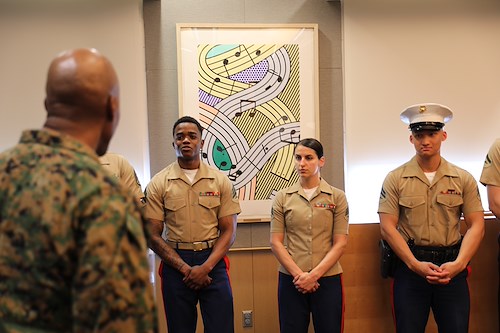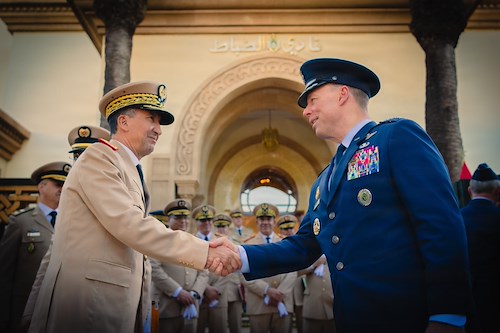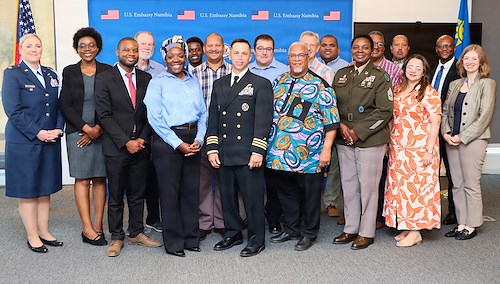Gallery contains 6 images
×
Photo 1 of 6
U.S. Africa Command
The commander of U.S. Africa Command and U.S. Marine Corps Gen. Michael Langley speaks to a group of U.S. Marines during a troop engagement, Nov. 4, 2024 in Libreville, Gabon. As a Marine Corps Embassy Security Guard, the Marines are responsible for being trained and fully equipped to serve at designated U.S. diplomatic missions in support of the Department of State in the protection of personnel, classified material, and U.S. property. (U.S. State Department photo by Joshua Root)
Photo by: Maj. Mahalia Frost
Photo 2 of 6
U.S. Africa Command
The commander of U.S. Africa Command and U.S. Marine Corps Gen. Michael Langley speaks to a group of U.S. troops and State Department personnel on the importance their role plays in supporting the command’s charge of uniting with African partners to promote regional security, stability and prosperity, Nov. 6, 2024 in Monrovia, Liberia. From Nov. 4-10, 2024, Gen. Langley expanded his campaign of learning footprint to three western region countries on the continent of Africa – Gabon, Liberia, and Nigeria. (U.S. Department of Defense photo by Air Force Maj. Mahalia Frost)
Photo by: Maj. Mahalia Frost
Photo 3 of 6
U.S. Africa Command
A group of neonatal nurses with the U.S. Agency for International Development (USAID) show U.S. Marine Corps Gen. and commander of U.S. Africa Command Michael Langley the medical care provided to babies in the pediatric unit at a local clinic in Abuja, Nigeria, Nov. 9, 2024. When facing complex challenges whether it’s from combatting violent extremist organizations or other factors that yield instability, Nigeria’s strategic efforts to tackle its known insecurities, extend beyond its military. The Nigerian Armed Force’s commitment to addressing health issues can be seen in their collaboration both on medical care initiatives with U.S. Agency for International Development and through the public health partnership between the Nigerian Ministry of Defence and U.S. Department of Defense’s Walter Reed Army Institute for Research, which resulted in the establishment of Nigeria’s Defence Reference Laboratory, an internationally accredited facility. (U.S. Department of State photo by Benevolent Okpogor)
Photo by: Maj. Mahalia Frost
Photo 4 of 6
U.S. Africa Command
Researchers at Nigeria’s Defence Reference Laboratory in Abuja, Nigeria, alongside leaders of the Nigerian Ministry of Defence, give U.S. Marine Corps Gen. and commander of U.S. Africa Command Michael Langley a tour of the tuberculous research facility Nov. 9, 2024. Commissioned in 2012, through the public health partnership between the Nigerian Ministry of Defence and U.S. Department of Defense’s Walter Reed Army Institute for Research, Nigeria’s Defence Reference Laboratory, an internationally accredited facility, was established. “What I saw here today is a true example of health diplomacy and also strategic ways of focusing on building enduring security relations, especially when dealing with threats of infectious disease,” Langley stated. (U.S. Department of State photo by Benevolent Okpogor)
Photo by: Maj. Mahalia Frost
Photo 5 of 6
U.S. Africa Command
The commander of U.S. Africa Command and U.S. Marine Corps Gen. Michael Langley signs Nigeria’s 18th Chief of Defence Staff, Gen. Christopher Musa’s visitor book following their meeting at the Defence Headquarters in Abuja, Nigeria, Nov. 8, 2024. Alongside the U.S. Ambassador to Nigeria, Ambassador Richard Mills, Jr., and some AFRICOM staff, Langley’s conversation focused on advancing shared security interests, global health security, development, and resource challenges. (U.S. Department of Defense courtesy photo by Nigerian Armed Forces)
Photo by: Maj. Mahalia Frost
Photo 6 of 6
U.S. Africa Command
Members of the Nigerian Armed Forces and Researchers at Nigeria’s Defence Reference Laboratory in Abuja, Nigeria, present information of the ministry’s efforts to combat global health insecurity to leaders of the Nigerian Ministry of Defence and U.S. Africa Command during a tour in Abuja, Nigeria, Nov. 9, 2024. Commissioned in 2012, through the public health partnership between the Nigerian Ministry of Defence and U.S. Department of Defense’s Walter Reed Army Institute for Research, Nigeria’s Defence Reference Laboratory, an internationally accredited facility, was established. “What I saw here today is a true example of health diplomacy and also strategic ways of focusing on building enduring security relations, especially when dealing with threats of infectious disease,” Langley stated. (U.S. Department of State photo by Benevolent Okpogor)
Photo by: Maj. Mahalia Frost
It was once stated that the journey of a thousand miles was not for the weak, but for the one who was willing to be courageously intentional about every step taken along the path. That level of grit, no matter where one started, is what continues to fuel the men and women of U.S. Africa Command to challenge the status quo, build partnerships, and collaborate with African partners to face complex challenges in a dynamic environment.
Surrounded around interagency partners and thought leaders, from Nov. 4-10, 2024, the commander of U.S. Africa Command and U.S. Marine Corps Gen. Michael Langley expanded his campaign of learning footprint to three western region countries on the continent of Africa – Gabon, Liberia, and Nigeria.
Gabon
During his visit to Gabon, Langley met with Ambassador Vernelle FitzPatrick, U.S. Ambassador to Gabon, to discuss strategic efforts to further stability and prosperity in the region.
As a country located on the outer coastlines of the continent, challenges ranging from maritime security and border security continually contests the overall ecosystem in Gabon.
“It is through our joint exercises …working together for many years where we address some of the changing dynamics of the security situation,” Langley stated.
Following his meeting with Gabon’s President, Brice Oligui Nguema, Langley emphasized how the two country’s ability to work together can produce the security solutions that are African-led and U.S.-enabled.
“We have shared objectives and shared challenges,” Langley said. “Meeting with the President was an opportunity to discuss the progress we’re making with our mil-to-mil relationships.”
Liberia
During Langley’s first visit to Liberia, he met with Ambassador Mark Toner, U.S. Ambassador to Liberia; President H. E. Joseph Boakai; Minister of National Defense, Brig. Gen. (Rtd.) Geraldine Janet George; and Chief of Staff of the Armed Forces of Liberia, Brig. Gen. Davidson Fayiah Forleh.
This visit provided an opportunity to communicate shared ideas, address challenges, and explore areas for cooperation.
“U.S. Africa Command advances vital U.S. national security interests throughout Africa,” said Toner. “It does this through focused and sustained engagement with our partners on the African continent and in support of our shared security and objectives. General Langley’s presence here today is a testament to the strong military partnership the U.S. shares with Liberia.”
When asked more on the meaning to why Langley mentions shared values and shared objectives, the general explained that when he visits a country and he and the African partners “recognize the challenges and opportunities to work together, whether it be violent extremist organizations or whether it be climate change and building resiliency or providing for civil society that’s what those opportunities are, and they’re rewarding.”
The need for resiliency and the ability to counter the destabilizing tactics of some malign actors is a challenge across the Sahel and in Central Africa and plays a role in reinforcing U.S.’s enduring partnerships across the continent.
“So when we talk about a security construct, understanding how discord and instability are sown is critical,” Langley shared during a press conference in Liberia. “Destabilizing type activities, mainly brought about by misinformation and disinformation…sowing discord of belief and false stories can reduce civil society’s confidence in their governance, and are illicit activities occurring in the information space.”
Nigeria
During his visit to Nigeria, Langley met with a number of people, including Nigeria’s 18th Chief of Defence Staff, Gen. Christopher Musa, at the Defence Headquarters in Abuja to discuss advancing shared security interests, global health security, development and resource challenges. He also met with Ambassador Richard Mills, Jr., U.S. Ambassador to Nigeria.
“Our bilateral relationship is based on shared values and understanding,” Langley stated.
When facing complex challenges whether it’s from combatting violent extremist organizations or other factors that yield instability, Nigeria’s strategic efforts to tackle its known insecurities, extend beyond its military.
In addition to the Nigerian Armed Force’s commitment to regional counterterrorism and crime cooperation, their commitment to addressing health issues can be seen in their collaboration both on medical care initiatives with U.S. Agency for International Development and through the public health partnership between the Nigerian Ministry of Defence and U.S. Department of Defense’s Walter Reed Army Institute for Research, which resulted in the establishment of Nigeria’s Defence Reference Laboratory, an internationally accredited facility.
“What we’re trying to achieve in our overall strategy is to deepen our partnerships and build the best resilience through a unity of effort,” said Langley. “What I saw here today is a true example of health diplomacy and also strategic ways of focusing on building enduring security relations, especially when dealing with threats of infectious disease.”
U.S.-Nigeria cooperation expands across the command’s three-dimensional construct: development, diplomacy, and defense.
Bilateral efforts emphasize shared values and demonstrates how fostering relationships built on trust, respect, and communication all while ensuring African partners remain at the forefront of the command’s strategic efforts underpins AFRICOM’s ability to join its partners in promoting regional security, stability and prosperity.






















